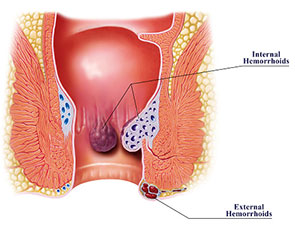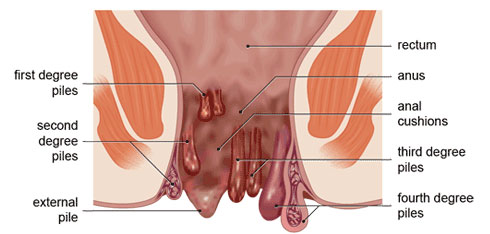Hemorrhoids (HEM-uh-roids), also called piles, are swollen and inflamed veins in your anus and lower rectum. Hemorrhoids may result from straining during bowel movements or from the increased pressure on these veins during pregnancy, among other causes. Hemorrhoids may be located inside the rectum (internal hemorrhoids), or they may develop under the skin around the anus (external hemorrhoids).
Hemorrhoids are common ailments. By age 50, about half of adults have had to deal with the itching, discomfort and bleeding that can signal the presence of hemorrhoids.


Hemorrhoid symptoms usually depend on the location. Internal hemorrhoids lie inside the rectum. You usually can't see or feel these hemorrhoids, and they usually don't cause discomfort.
But straining or irritation when passing stool can damage a hemorrhoid's delicate surface and cause it to bleed. Occasionally, straining can push an internal hemorrhoid through the anal opening. This is known as a protruding or prolapsed hemorrhoid and can cause pain and irritation.
External hemorrhoids are under the skin around your anus. When irritated, external hemorrhoids can itch or bleed. Sometimes blood may pool in an external hemorrhoid and form a clot (thrombus), resulting in severe pain, swelling and inflammation.
Bleeding during bowel movements is the most common sign of hemorrhoids. But rectal bleeding can occur with other diseases, including colorectal cancer and anal cancer. Don't assume that bleeding is coming from hemorrhoids without consulting a doctor.
Your doctor can do a physical examination and perform other tests to diagnose hemorrhoids and rule out more-serious conditions or diseases. Consider seeking medical advice if your hemorrhoids cause pain, bleed frequently or excessively, or don't improve with home remedies.
The veins around your anus tend to stretch under pressure and may bulge or swell. Swollen veins (hemorrhoids) can develop from an increase in pressure in the lower rectum. Factors that might cause increased pressure include:
Hemorrhoids are more likely as you get older because the tissues that support the veins in your rectum and anus can weaken and stretch with aging.
Anemia: Chronic blood loss from hemorrhoids may cause anemia, in which you don't have enough healthy red blood cells to carry oxygen to your cells. This may result in fatigue and weakness.
Strangulated hemorrhoid : If blood supply to an internal hemorrhoid is cut off, the hemorrhoid may be "strangulated," which can cause extreme pain and lead to tissue death (gangrene).
The best way to prevent hemorrhoids is to keep your stools soft, so they pass easily. To prevent hemorrhoids and reduce symptoms of hemorrhoids, follow these tips:
Hemorrhoid laser procedure (LHP) is a new laser procedure for outpatient treatment of hemorrhoids in which hemorrhoidal arterial flow feeding the hemorrhoidal plexus is stopped by laser coagulation.
